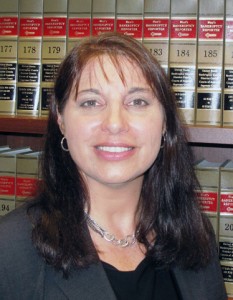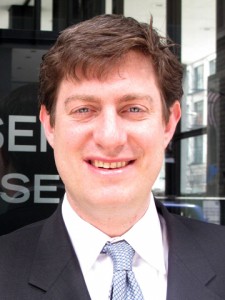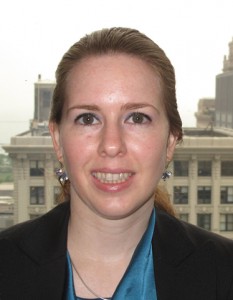Currently, eight alumni and two students are either already clerking or have received offers to clerk at the U.S. District Courts, U.S. Bankruptcy Court, and the U.S. Court of Appeals for the Seventh Circuit. There also are nine alumni currently working as attorney advisers in the U.S. Social Security Administration in Chicago, positions similar to judicial clerkships.
“This is part of an evolution of our law school that began a few years ago,” said Dean John E. Corkery. “Our graduates are getting these highly sought after jobs with distinguished judges today because they are talented and accomplished students who have worked hard and taken full advantage of the programs we offer at John Marshall to help them succeed in law and in life.”
The John Marshall graduate and current clerk with the most experience undoubtedly is Mary Barry, who graduated in 2004 and whose first job out of law school was as a clerk for Judge Bruce Black, chief judge of the U.S. Bankruptcy Court for the Northern District of Illinois.
Barry, 49, has clerked for Black for seven years and she credits an externship with the U.S. Trustee’s Office during law school for getting her the job. Because of that externship, Black was familiar with Barry’s work and she was asked to apply when the clerk position became open.
“I think this is probably the best job in the world,” she said. “Bankruptcy is one of the few areas of law that is still malleable, and it’s a hot topic given the state of the economy.”
As Black’s senior clerk, Barry has a front row seat to watch the evolution of bankruptcy law. Barry and the other clerks conduct legal research and draft opinions, prepare memos for the judge detailing cases and suggesting rulings, and then meet with him to discuss the options.
“Judge Black considers his law clerks to be his legal counsel. Our job is to advise the judge on every matter that comes before him,” Barry said. “As his senior clerk, I review everything before it goes to the judge. The buck stops here.”
Barry already knows what Michael DeMarino (JD ’09) is anticipating. DeMarino, 32, a commercial litigator at Reed Smith, is set to begin a prestigious clerkship in September with Justice William Bauer on the U.S. Court of Appeals, Seventh Circuit.
“Aside from it being a feather in your cap,” DeMarino said, “the experience is going to be invaluable, with enormous learning opportunities.”
DeMarino, who also has worked at Jenner & Block, is in his third year as a lawyer. He has no issue with leaving his higher-paying position at a law firm for the clerkship.
“This is a dream job,” he said. “I’d work there for free.”
DeMarino thinks his lawyering experience helped win him the coveted spot, but he also notes that he spent much time researching Bauer’s opinions and suggests clerk candidates read at least 50, and maybe as many as 100, opinions written by the judge for whom they hope to work.
“I think I had a good understanding of the judge and his rulings,” DeMarino said, preparing him for the 30-minute one-on-one interview with Bauer. “The difference-maker is how well you mesh with the judge.”
Researching the judge is something that is also recommended by Jason Koransky (JD’10), who clerks for Judge Harry Leinenweber at the U.S. District Court, Northern District of Illinois.
Koransky has been clerking since September 2010 and has already had “amazing experiences,” participating in civil and criminal matters in federal court, including patent, trademark, civil rights, and terrorism cases.
“Our job is writing opinions,” he said. “The clerks have to provide the judge an accurate and succinct analysis of the issues in each case before us.”
Writing isn’t something that’s been a great struggle for Koransky, who holds an undergraduate journalism degree from Northwestern University and was editor from 1999 to 2009 for DownBeat magazine, which focuses on jazz and blues.
Koransky started law school in January 2007, attending John Marshall part-time at night. He made the move to law school when he saw the paradigm shift in the media and music industries and knew he should focus on his interest in intellectual property law. John Marshall, with its night-school offerings, accommodates non-traditional students, has “phenomenal” IP offerings, a really good writing program, and “does a good job of teaching practical skills,” he said.
“It’s important to know that the top students at John Marshall are as good as the top students at any of the top 10 law schools in the country,” Koransky said.
Koransky’s advice for current students: “Get the best grades possible or you won’t even be in the running, submit good writing samples, research the judge, and have an interesting resume.”
Erin McKibben (JD’10) agrees about getting the best grades. She began her one-year clerkship in January 2011 with Judge Charles Norgle, who graduated from John Marshall in 1969, and calls her clerkship “the best job a new lawyer could have.”
McKibben, who was managing editor of The John Marshall Review of Intellectual Property Law, also encourages current students to pursue writing opportunities.
Norgle said the role of a clerk is key to the judicial process: “Good adversaries and an intelligent, well-educated law clerk are vital to the court’s decision-making process.”
John Marshall Professor Paul Lewis, chair of the school’s judicial clerkship committee, says federal clerkships historically have been very difficult to attain, and have become even more competitive in the difficult job market.
“This recent achievement is a testament not only to the skills and preparedness of our strongest students, but also to the tremendous efforts exhibited by the Career Services Office (CSO),” Lewis said. “They do a great job.”
Third-year student Rob Olmstead, who begins a clerkship position in January 2012 with Leinenweber, also speaks highly of the CSO and the workshops it presents.
“That was very helpful in understanding what to do and what not to do,” he explained.
Olmstead said he found it particularly beneficial to have Professor Mary Nagel serve as his mentor during the extended application process. Nagel, who graduated from John Marshall in 1988, was a law clerk herself, serving for two judges in the Circuit Court of Cook County. Olmstead described Nagel as a tough professor, and said he chose her as his mentor for that very reason.
“If I could survive a mock interview with her, the actual interview would be a piece of cake,” he said.
In addition to holding workshops and informational programs for students, the Career Services Office provides individual counseling for students interested in post-graduate judicial clerkships. Students work with the judicial clerkship coordinator to develop a strategy for applying to these positions. The office also processes application materials for students who participate in the OSCAR federal clerkship application program. Tiffany Farber, an associate director in CSO, is the current judicial clerkship coordinator. She will work one-on-one with students to review their application materials, assign them to work with a faculty mentor (a member of the John Marshall Judicial Clerkship Committee), and assist in finalizing their materials by processing their letters of recommendation.
Olmstead offers one bit of advice to current clerkship applicants that they might want to consider: “Make sure that you are respectful to the current clerks as well as the judge’s secretary and the court deputy. A favorable opinion from them is not going to get you the job, but an unfavorable opinion from them is probably going to sink you.”
Black, the Bankruptcy Court judge, sees a federal judicial clerkship as a “win-win” situation with both the clerk and the judge reaping tremendous benefits.
“For the clerk it is a unique chance to see a court from the inside. For the judge it is a chance to receive legal advice from a gifted young attorney,” he said. “Usually, both benefit from the formation of a close personal relationship that is almost like family. Indeed, when former clerks become parents, my wife and I consider their children to be our ‘grandclerks’.”
During the past 10 years, Black has had seven law clerks, six of whom are John Marshall graduates.
“Each year on the anniversary of my appointment as a federal judge, my wife and I host a reunion dinner for former clerks and their spouses or significant others,” Black said. “It is always one of the highlights of my year, and it always reminds me that my law clerks make my job the best job in the world.



